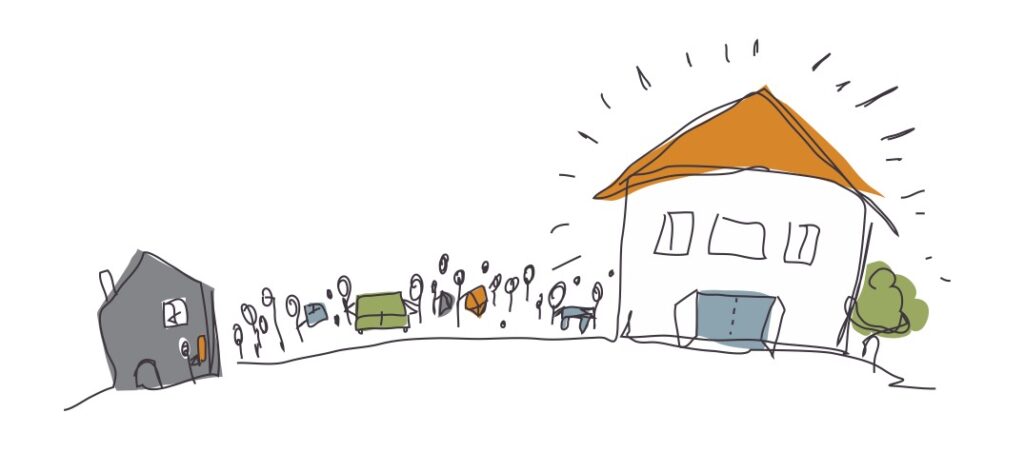Category Archives: Online Civility
Front Porch Forum is Part of “Why We Shouldn’t Give Up on the Internet”
New_ Public’s Eli Pariser Delivers a Speech at the Vatican Featuring Front Porch Forum
Eli Pariser is an author, activist, and entrepreneur focused on how to make technology and media serve democracy. He helped lead MoveOn.org, co-founded Upworthy, wrote “The Filter Bubble,” and is currently Co-Director of New_ Public. He has highlighted Front Porch Forum in numerous pieces and conversations, shining a light on its ability to lead to healthier communities thanks to its intentional design.
You can imagine our surprise – and delight – when he delivered a powerful speech to an audience that included Pope Francis at the Vatican’s Jubilee of the World of Communications – and put Front Porch Forum at the heart of his argument for “why we shouldn’t give up on the Internet.”
Here’s a highlight:
In Vermont, a small state in the northeast of the United States, people use Facebook and TikTok but town conversation mostly doesn’t happen there. They have something more like an actual digital town square — a home-grown social network called Front Porch Forum built specifically for the purpose of allowing towns to have good discussions.
Front Porch Forum has never taken venture capital and isn’t seeking to make a ton of money from advertisers. In fact, it’s a public benefit corporation that is not intended to make more money than is required to sustain itself. It’s always been built not for advertisers but to serve communities in Vermont first. And as a result, it can do conversations differently.
Because it doesn’t need to worry primarily about advertisers or engagement, instead of optimizing for the most posts possible, FPF optimizes for thoughtfulness — by updating only once a day. It’s a bold statement that says: slow down. Think about what you’re saying. And say something meaningful. And among other things, it makes having a flame war really arduous, because you have to be willing to carry it on for days at a time.
One of the things that FPF shows us is that these aren’t places we need to spend a lot of time for them to change us and foster stronger communities.
In our offline lives, places of worship are a great example of this: Even among the faithful, there are few that spend a large proportion of our time literally inside a church or synagogue or mosque or temple. But the parts of us that are nourished by these spaces remain fortified when we leave.
The same is true of the digital public spaces — we don’t need to vanquish Meta or TikTok entirely to make digital space building worth doing. People use Instagram in Vermont too… but FPF adds to their lives.
Front Porch Forum also puts its money where its mouth is when it comes to stewardship — in fact, while only a tiny fraction of people at TikTok or Meta work as moderators, at the 40-person organization of Front Porch Forum, half of the employees are paid moderators.
With this ratio of stewards to content, every single message can be read before it reaches everyone else to make sure it conforms to the very clear and thoughtful set of norms that have been co-developed over 20 years with community members. And when messages don’t — which happens sometimes — they don’t just disappear. Instead, you get a friendly note from one of the stewards asking you to phrase things differently.
And so, conversation goes better. People know their neighbors better. Communities are healthier. We conducted survey research on Front Porch Forum’s impact and found that not only did people across the political spectrum and across demographics like it much more than Facebook or Nextdoor, they also got more involved in the life of their town and were more committed neighbors as a result.
Of course, Front Porch Forum only exists in one small state in the United States. In most places around the country and the globe, these local conversations happen in forums like Facebook Groups and Nextdoor that are much less well designed for this purpose. But at New_ Public, the nonprofit R&D lab I run, we think Front Porch Forum is on to something big.
Read all about the experience in this New_ Public blog post.
Read the speech in its entirety here.
Watch and listen to Eli’s address (the bit about Front Porch Forum can be found at the 32-minute mark)
Sweet and Simply Put…
This posting from a member in Hardwick just came in and warmed our hearts.
“I am so grateful for FPF for the sense of community and support; any time I post, I am overwhelmed with responses that leave me feeling cared for and with a sense of belonging.” – Lisa, Hardwick
Fixing Digital Public Spaces
Leslie Stebbins was quoted in a recent Salon article, “Our digital public spaces aren’t so healthy… Can we fix that?” (read full article here) that…
“Tech companies maintain that they cannot moderate online communities because that would jeopardize our right to free speech and because there is simply too much content flying across these networks to track. Both these issues are false flags. We now know that the core infrastructure of these platforms is intentionally designed to amplify vitriol and misinformation because this increases engagement, keeps us online longer, and provides tech companies with billions of dollars from ad revenue. It doesn’t have to be this way.“
Further, Stebbins adds, “We should focus on creating new spaces that have explicit civic goals and are designed for equity and social cohesion. Real-world communities need to be involved in intentionally designing their own local digital public spaces rather than leaving this work to global tech companies.”
Front Porch Forum gets a nice spotlight in the article…
“Front Porch Forum […] focuses on real world community building. It is the antithesis of Facebook, TikTok, and Twitter. Rather than try to keep users online, it strives to get people offline and more connected to their local Vermont neighbors. Most people spend five or ten minutes a day online to get news that their neighbors have posted: lost dogs, bake sales and announcements of upcoming school board meetings. It is funded by donations and local ads based on where someone lives, but it does not track user behavior and advertising does not drive platform design.“
“Independent research on Front Porch [Forum] shows that it builds social cohesion and is improving the resilience of local Vermont communities. Building stronger community cohesion produces many intangible benefits such as high civic engagement, more instances of neighbors helping neighbors, and lower crime rates.“
Another Shout Out to FPF in NY Times
Thanks to Jill who just posted on the Craftsbury Forum:
“I just came across this New York Times article recognizing the great job Front Porch Forum is doing with keeping Vermonters connected. I know my family and I are grateful for the network it provides.”

Talking Politics on FPF – Finding the “Shared Middle”
Cara in the Town of Halifax recently posted the following on her local Front Porch Forum when a neighbor suggested banning political speech on FPF. We love her perspective on this. Read on…
Some postings on FPF concern politics at every level – local (like the 5-person board discussion), state (Article 22) and national (names of parties). FPF *is* a place to have these discussions – there is, after all, a standard category called “election.”
The people in our small communities all share certain values – the ones that lead people who were born here to stay and that lead people who weren’t born here to make it their home.
But we don’t all share the same views, not by a long stretch. The value of FPF is that it makes it possible to find common ground and discover you like or respect people despite the fact that you may wildly disagree on issues.
That’s missing in so many parts of our lives. Let’s not strip it out of FPF, too.
I’ll recommend an episode of the podcast Revisionist History to illustrate the point. It’s hosted by Malcolm Gladwell (FN: If you don’t like him, no worries – I never did before either but it’s a terrific podcast, not glib like so much of his writing). The episode is called “When Will Met Grace” (FN: if you never liked the show, no worries – I never did either but the episode made me appreciate it). Gladwell notes that the show was hated by ultra conservatives and ultra progressives alike. But the show was on one of the four TV networks we all watched, and that resulted in it having a demonstrably moderating effect on private lives and on the national conversation.
Unfortunately, it’s so easy to avoid these days. Nowadays, people think they’re achieving that same goal by watching both Fox News and MSNBC, or reading the Wall Street Journal and the Washington Post. But consuming two extremes isn’t the same as consuming something shared in the middle.
That’s why I love FPF. It doesn’t permit anonymous posts. It’s limited to folks who have planted themselves in a small geographic area. And, most importantly, it caters to everything from lost cats to roofer recommendations to crime reports to asking for help to stack wood to, yes, politics. I like that it’s everything – because in that way, it has the capacity to have a moderating effect on all of our lives in all sorts of ways. I know for a fact that it’s helped me forge a sense of connection and community with people I wouldn’t otherwise have had an opportunity to meet or know if we all veered off into our political silos. Knowing that we have such wildly divergent views on things is important because it’s part of what makes the connection so valuable and ultimately, gives me hope.
We can only control our own conduct. If I don’t jibe with a particular person in the community or with certain views and it bothers me to see some posts? The answer isn’t to tell people to be quiet. The answer is for me to decide I don’t want to listen. But I do listen and I know from personal experience that my world is richer as a result.
I hope everyone will feel free to keep posting and keep all of these conversations going. I agree there’s no room here for hateful political or personal attacks, but just because a view is expressed that one doesn’t agree with doesn’t make it hateful.
About Blog
Ghost of Midnight is an online journal about fostering community within neighborhoods, with a special focus on Front Porch Forum (FPF). My wife, Valerie, and I founded FPF in 2006... read more
Post Categories
- Uncategorized
- PDF2009
- Calendar
- Northeast Kingdom
- podcast
- Peer Rental
- Localization
- Big Tech
- Events
- PDF2007
- Web Traffic
- Google AdSense
- Pay It Forward
- Elections
- berkmansunlight
- Maps
- Video
- Upstate New York
- Coupons
- Wildlife
- Mobile
- Viral Marketing
- Raffle
- Crisis Response
- Donations
- Lost & Found
- Real Estate
- College Students
- Gratitude
- Social Responsibility
- Orton Family Foundation
- Start ups
- Make It Your Own Awards
- Online Civility
- Clay Shirky
- Newspapers
- Humor
- How To Use FPF
- Online Classified Ads
- Peer Reviews
- Best of FPF
- Politics
- Community Management
- Economic Development
- Local Reviews
- Case Foundation
- Borrow and Lend
- Neighborhood Watch
- Good Government
- Small Business Advertising
- Citizen Journalism
- e-Vermont
- Democracy
- Local Search
- Knight Foundation
- Burlington
- MacArthur Fellows
- Civic Engagement
- Social Media
- social capital
- Social Networking
- Vermont
- Neighborhood
- Community Building
- Local Online
- Front Porch Forum








